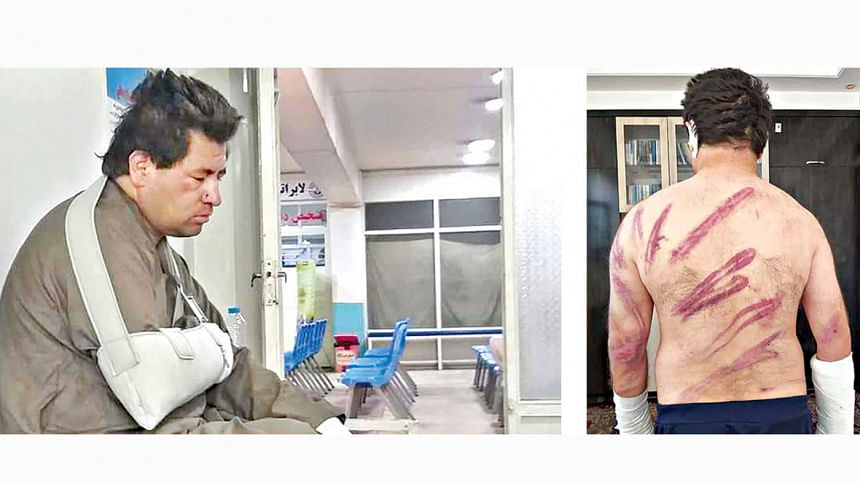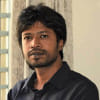We can behead ‘kafirs’ like you

Habibullah Farzad, a Ph.D. scholar of the South Asian University, New Delhi and also a human rights activist, was beaten mercilessly by Taliban for participating in a protest for women's rights on 8th September in Kabul. Habib Farzad who has sustained multiple injuries including a broken hand talked to The Daily Star's correspondent Mostafa Shabuj about Afghanistan under the Taliban rule.
The Daily Star: What actually happened that day?
Habibullah Farzad: On Wednesday, 50-60 female students and activists and 5-6 male protesters, including me, were staging a protest demanding greater rights for women. Our aim was to defend rights of all citizens, but especially that of women, who are facing serious threat despite the Taliban promises.
After one hour later, when we started our slogan, some Taliban armed soldiers arrived at the scene and tried to detain the male protesters. I told them that we were staging a peaceful protest but they forcefully took me and the other male protesters to a nearby police office. They said we were not protesting against the Taliban, but against Islam.
Around 11 am, they took me to a room where 4-5 Taliban men were waiting. They handcuffed my hands behind the back and started beating me brutally. Within 5-6 minutes, I lost my consciousness and when I woke up approximately an hour later, I found myself on the nearby corridor. Then they took me to other room where there were more detained people including journalists.
Then the Taliban forced me to change my blood-soaked clothes and advised me to wear traditional Afghan clothes. I was wounded seriously. Besides the bruises, my right hand was broken.
Nearly after three hours of my arrest, they released me because the female protesters were continuing their protest demanding our release. Before releasing me, the Taliban took my fingerprint on a written paper which I was not allowed to read.
Before releasing us, they accused us of protesting against the Islamic state and forbade us against more protests. "You are acting against Islam so we are allowed to kill kafirs like you," they warned us.
TDS: Who are protesting? Is it ethnocentric or collective?
Habib: Though the protests are concentrated in urban areas and mostly being conducted by rights groups and ethnic minorities, I can say, they are collective in nature. All people who are concerned about the crackdown on rights under Taliban, irrespective of their ethnicities, are protesting.
TDS: How the Taliban takeover has impacted people so far?
Habib: So much happening right now. There is so much uncertainty and panic. The public places are mostly empty. Media is restricted. All educational institutions are closed. People are losing their jobs, passing time at home hopelessly. The economy is collapsing very first, especially the small and medium businesses. We are seeing desperate people crowding outside banks to withdraw some money. Everything is changing so fast and the sense of insecurity is driving people to leave the country. But unfortunately the borders are closed too.
TDS: What differences you see between the West-backed government and the Taliban? Habib: I am not supportive of the previous government too. However the previous US-backed regime at least tried to protect the rights of minority ethnic groups. The discriminations were there but not this explicit under the Taliban.
TDS: How the allegedly corrupt Karzai and Ghani regimes secured rights of minorities?
Habib: Yes, you are right. They were corrupt and they both belong from the Pashtuns, who have dominated Afghanistan for centuries. But when we compare the previous regimes and the Taliban government, there were limited opportunities for the minorities. I mean the previous governments at least promised and provided some opportunities and freedom to women and others which we can't ignore. Now, under the Taliban, we risk losing everything we achieved in the last 20 years.
TDS: Is the Taliban government inclusive?
Habib: The new government is not inclusive. So far, the actions taken by the Taliban do not reflect their promises to the Afghans and international community. This caretaker government is formed mostly by the Islamic clergy, mullahs from the male dominated Pashtun ethnic group only.
TDS: Will the Taliban engage youth to reconstruct the nation?
Habib: The Taliban are not interested in using the educated, talented youth who grew up in the democratic era. Last week, the caretaker government' education minister Sheikh Moulavi Noorullah Munir clearly stated that Ph.D., Master's degrees carry no value to them as they are eying to govern the country by clergies and moulavis.
TDS: Do you think the Taliban will repeat their mistake by harboring global jihadists?
Habib: For recognition by international community, the Taliban leaders will try to distance themselves from the global jihadists. But it will be tough for the top leadership to control the regional and local leaderships from cutting ties with the jihadists who are still participating actively in the Taliban movement and share close bonds with some powerful factions within the group.
TDS: What is the destiny of the Afghans under the Taliban regime?
Habib: The signs are not promising. I think we are heading for another civil war.

 For all latest news, follow The Daily Star's Google News channel.
For all latest news, follow The Daily Star's Google News channel. 




Comments